Leadership and Management Principles: Assignment Report for University
VerifiedAdded on 2020/03/04
|11
|2134
|95
Homework Assignment
AI Summary
This assignment delves into the multifaceted realm of leadership and management, commencing with an exploration of critical thinking within the context of leadership. It then progresses to examine referencing styles, followed by practical applications of effective email communication in professional settings. The assignment further extends to the deconstruction of management concepts, such as the competing values framework and the principles of Henri Fayol. The student provides examples of conflict resolution and demonstrates an understanding of key management theories and their practical implications. The content covers various aspects of leadership, including how to deal with complexity, division of work, and communication strategies. It also includes a follow-up email sample and a case study on miscommunication in group assignments.
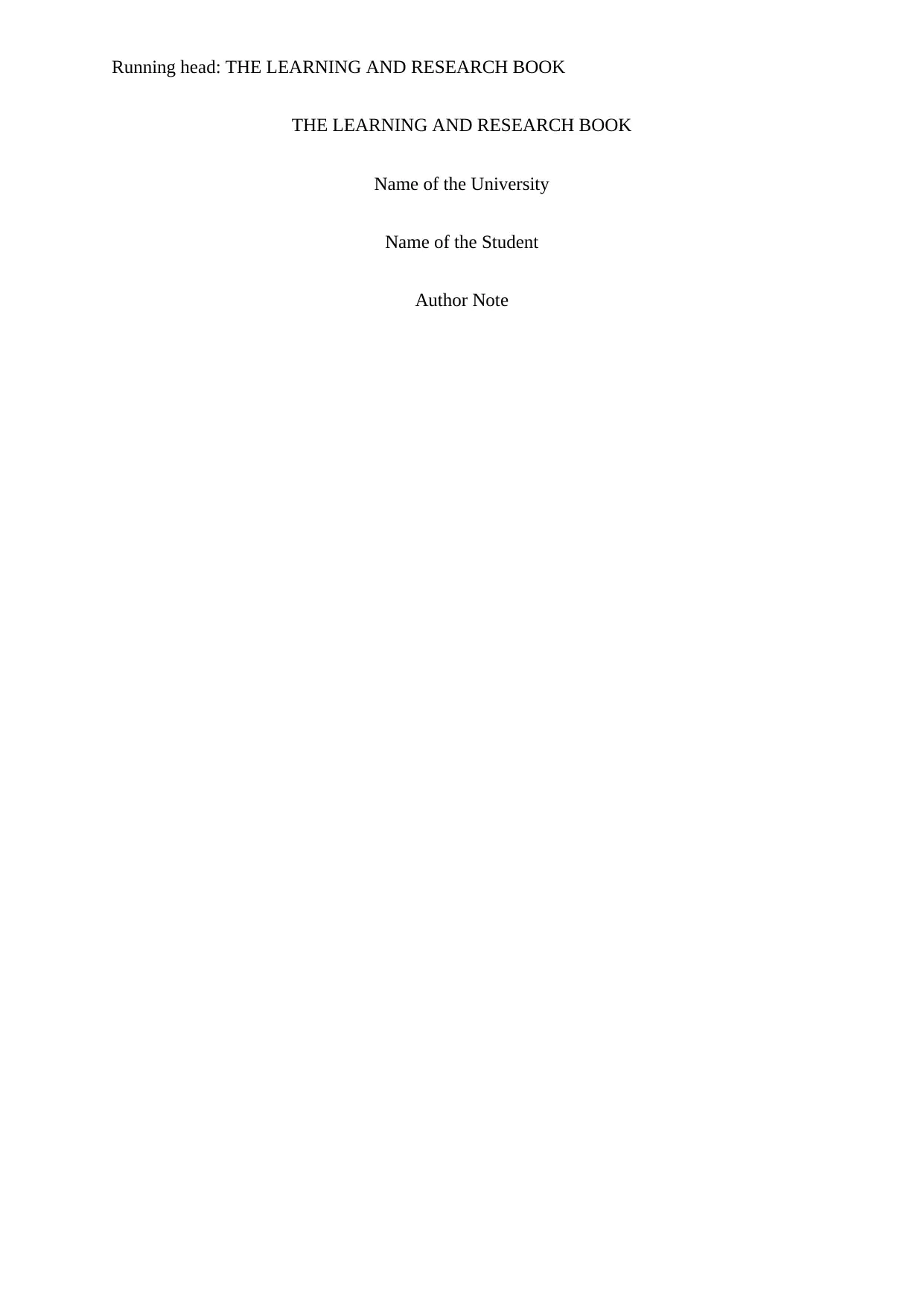
Running head: THE LEARNING AND RESEARCH BOOK
THE LEARNING AND RESEARCH BOOK
Name of the University
Name of the Student
Author Note
THE LEARNING AND RESEARCH BOOK
Name of the University
Name of the Student
Author Note
Paraphrase This Document
Need a fresh take? Get an instant paraphrase of this document with our AI Paraphraser
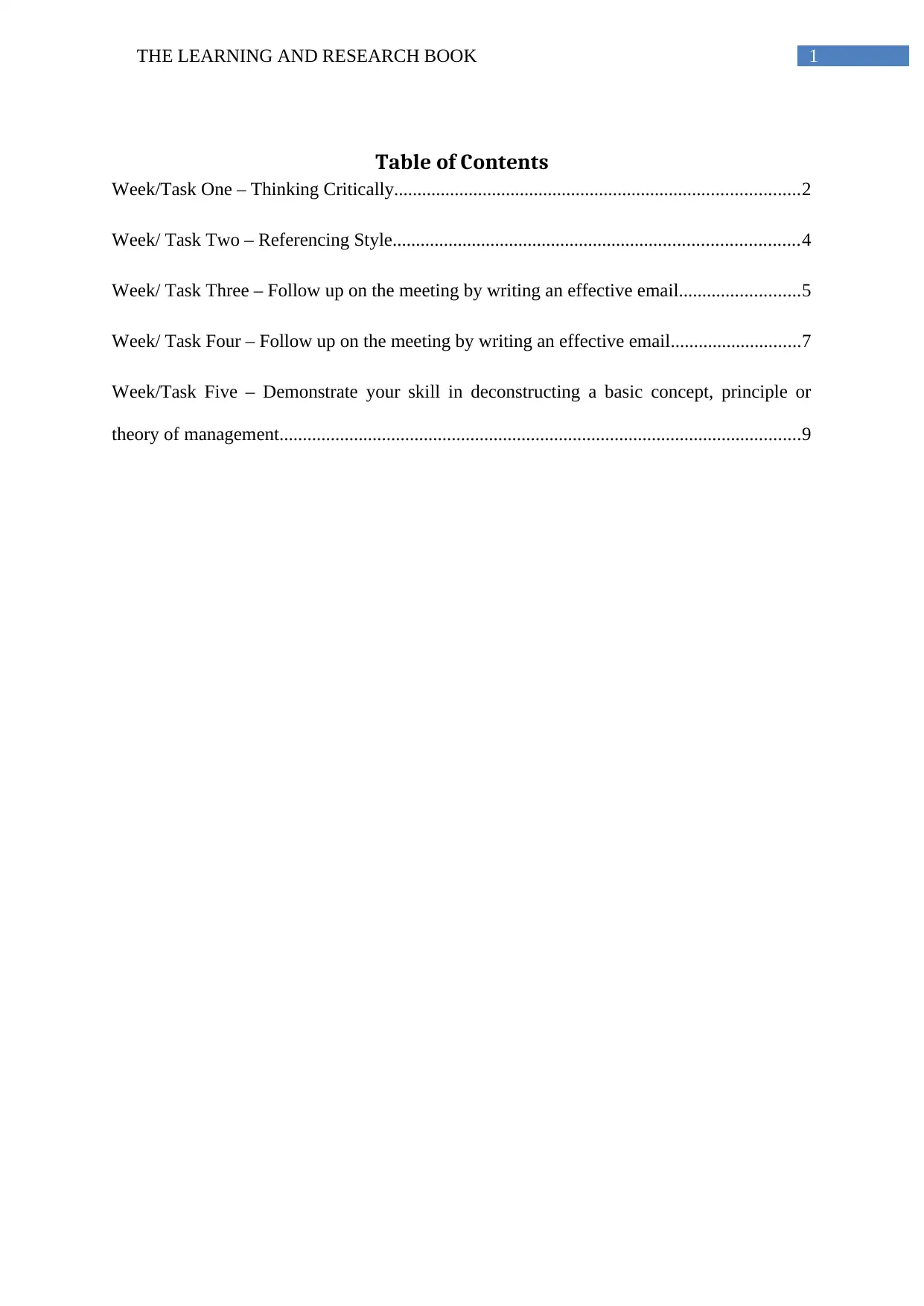
1THE LEARNING AND RESEARCH BOOK
Table of Contents
Week/Task One – Thinking Critically.......................................................................................2
Week/ Task Two – Referencing Style.......................................................................................4
Week/ Task Three – Follow up on the meeting by writing an effective email..........................5
Week/ Task Four – Follow up on the meeting by writing an effective email............................7
Week/Task Five – Demonstrate your skill in deconstructing a basic concept, principle or
theory of management................................................................................................................9
Table of Contents
Week/Task One – Thinking Critically.......................................................................................2
Week/ Task Two – Referencing Style.......................................................................................4
Week/ Task Three – Follow up on the meeting by writing an effective email..........................5
Week/ Task Four – Follow up on the meeting by writing an effective email............................7
Week/Task Five – Demonstrate your skill in deconstructing a basic concept, principle or
theory of management................................................................................................................9
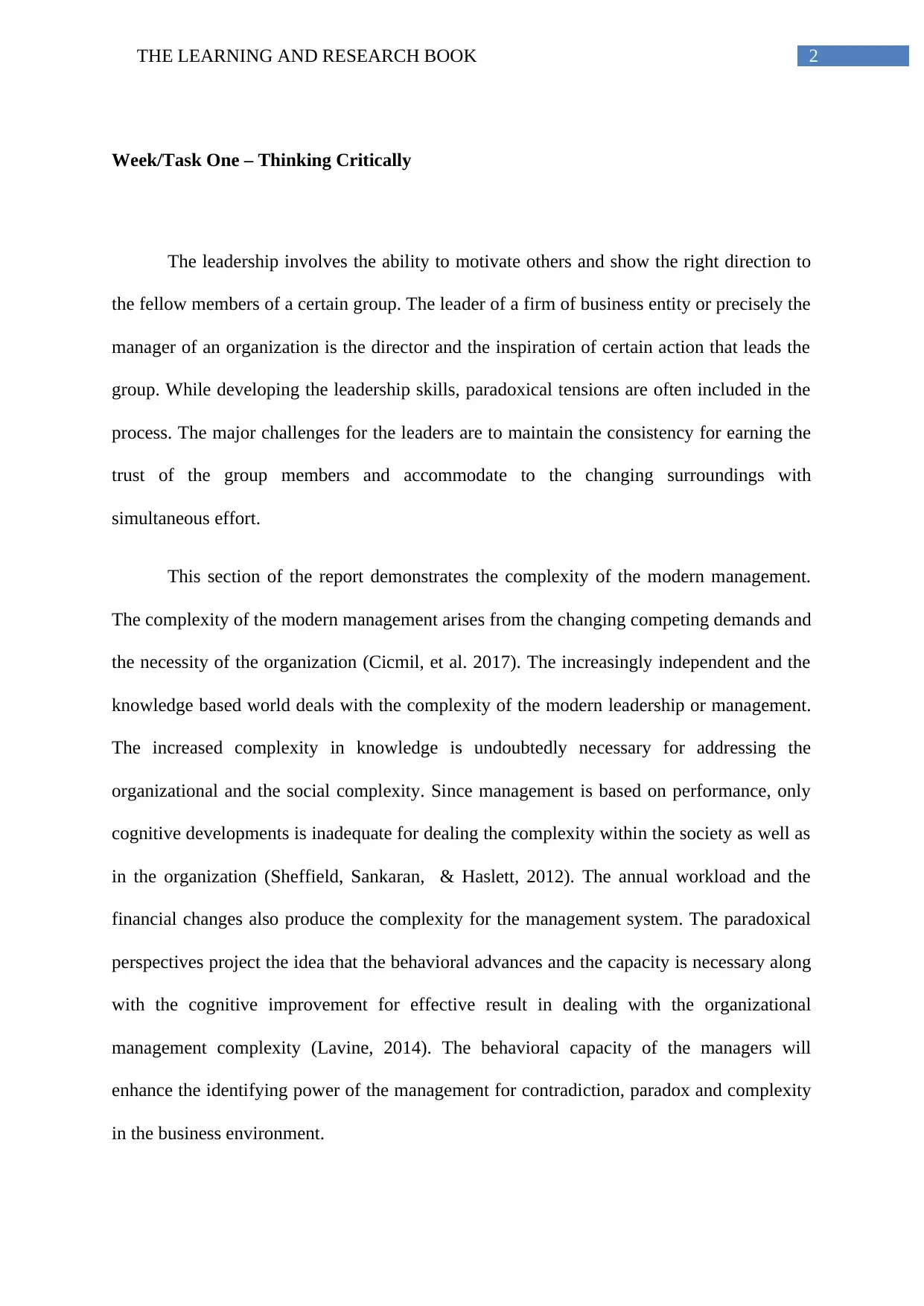
2THE LEARNING AND RESEARCH BOOK
Week/Task One – Thinking Critically
The leadership involves the ability to motivate others and show the right direction to
the fellow members of a certain group. The leader of a firm of business entity or precisely the
manager of an organization is the director and the inspiration of certain action that leads the
group. While developing the leadership skills, paradoxical tensions are often included in the
process. The major challenges for the leaders are to maintain the consistency for earning the
trust of the group members and accommodate to the changing surroundings with
simultaneous effort.
This section of the report demonstrates the complexity of the modern management.
The complexity of the modern management arises from the changing competing demands and
the necessity of the organization (Cicmil, et al. 2017). The increasingly independent and the
knowledge based world deals with the complexity of the modern leadership or management.
The increased complexity in knowledge is undoubtedly necessary for addressing the
organizational and the social complexity. Since management is based on performance, only
cognitive developments is inadequate for dealing the complexity within the society as well as
in the organization (Sheffield, Sankaran, & Haslett, 2012). The annual workload and the
financial changes also produce the complexity for the management system. The paradoxical
perspectives project the idea that the behavioral advances and the capacity is necessary along
with the cognitive improvement for effective result in dealing with the organizational
management complexity (Lavine, 2014). The behavioral capacity of the managers will
enhance the identifying power of the management for contradiction, paradox and complexity
in the business environment.
Week/Task One – Thinking Critically
The leadership involves the ability to motivate others and show the right direction to
the fellow members of a certain group. The leader of a firm of business entity or precisely the
manager of an organization is the director and the inspiration of certain action that leads the
group. While developing the leadership skills, paradoxical tensions are often included in the
process. The major challenges for the leaders are to maintain the consistency for earning the
trust of the group members and accommodate to the changing surroundings with
simultaneous effort.
This section of the report demonstrates the complexity of the modern management.
The complexity of the modern management arises from the changing competing demands and
the necessity of the organization (Cicmil, et al. 2017). The increasingly independent and the
knowledge based world deals with the complexity of the modern leadership or management.
The increased complexity in knowledge is undoubtedly necessary for addressing the
organizational and the social complexity. Since management is based on performance, only
cognitive developments is inadequate for dealing the complexity within the society as well as
in the organization (Sheffield, Sankaran, & Haslett, 2012). The annual workload and the
financial changes also produce the complexity for the management system. The paradoxical
perspectives project the idea that the behavioral advances and the capacity is necessary along
with the cognitive improvement for effective result in dealing with the organizational
management complexity (Lavine, 2014). The behavioral capacity of the managers will
enhance the identifying power of the management for contradiction, paradox and complexity
in the business environment.
⊘ This is a preview!⊘
Do you want full access?
Subscribe today to unlock all pages.

Trusted by 1+ million students worldwide
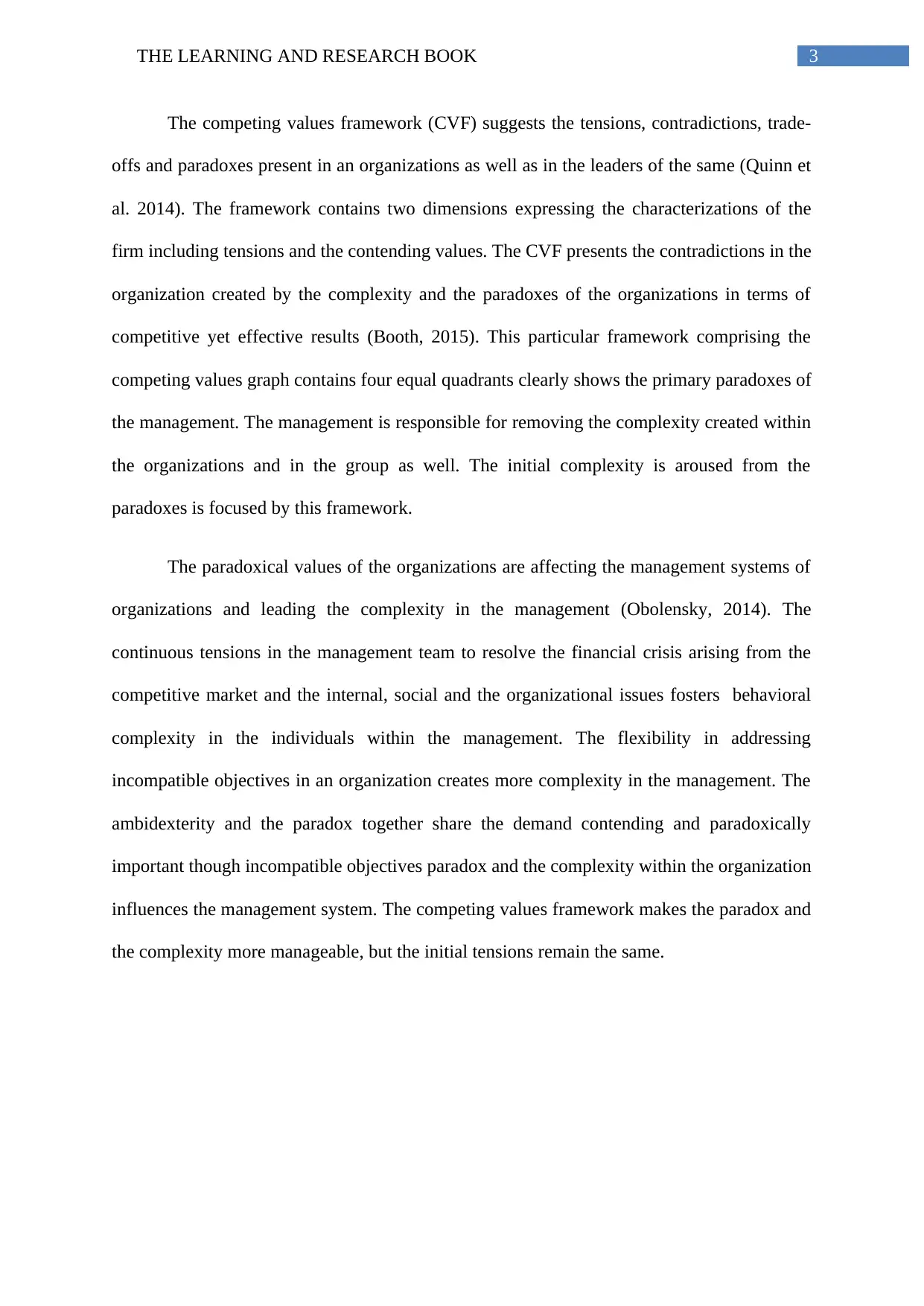
3THE LEARNING AND RESEARCH BOOK
The competing values framework (CVF) suggests the tensions, contradictions, trade-
offs and paradoxes present in an organizations as well as in the leaders of the same (Quinn et
al. 2014). The framework contains two dimensions expressing the characterizations of the
firm including tensions and the contending values. The CVF presents the contradictions in the
organization created by the complexity and the paradoxes of the organizations in terms of
competitive yet effective results (Booth, 2015). This particular framework comprising the
competing values graph contains four equal quadrants clearly shows the primary paradoxes of
the management. The management is responsible for removing the complexity created within
the organizations and in the group as well. The initial complexity is aroused from the
paradoxes is focused by this framework.
The paradoxical values of the organizations are affecting the management systems of
organizations and leading the complexity in the management (Obolensky, 2014). The
continuous tensions in the management team to resolve the financial crisis arising from the
competitive market and the internal, social and the organizational issues fosters behavioral
complexity in the individuals within the management. The flexibility in addressing
incompatible objectives in an organization creates more complexity in the management. The
ambidexterity and the paradox together share the demand contending and paradoxically
important though incompatible objectives paradox and the complexity within the organization
influences the management system. The competing values framework makes the paradox and
the complexity more manageable, but the initial tensions remain the same.
The competing values framework (CVF) suggests the tensions, contradictions, trade-
offs and paradoxes present in an organizations as well as in the leaders of the same (Quinn et
al. 2014). The framework contains two dimensions expressing the characterizations of the
firm including tensions and the contending values. The CVF presents the contradictions in the
organization created by the complexity and the paradoxes of the organizations in terms of
competitive yet effective results (Booth, 2015). This particular framework comprising the
competing values graph contains four equal quadrants clearly shows the primary paradoxes of
the management. The management is responsible for removing the complexity created within
the organizations and in the group as well. The initial complexity is aroused from the
paradoxes is focused by this framework.
The paradoxical values of the organizations are affecting the management systems of
organizations and leading the complexity in the management (Obolensky, 2014). The
continuous tensions in the management team to resolve the financial crisis arising from the
competitive market and the internal, social and the organizational issues fosters behavioral
complexity in the individuals within the management. The flexibility in addressing
incompatible objectives in an organization creates more complexity in the management. The
ambidexterity and the paradox together share the demand contending and paradoxically
important though incompatible objectives paradox and the complexity within the organization
influences the management system. The competing values framework makes the paradox and
the complexity more manageable, but the initial tensions remain the same.
Paraphrase This Document
Need a fresh take? Get an instant paraphrase of this document with our AI Paraphraser
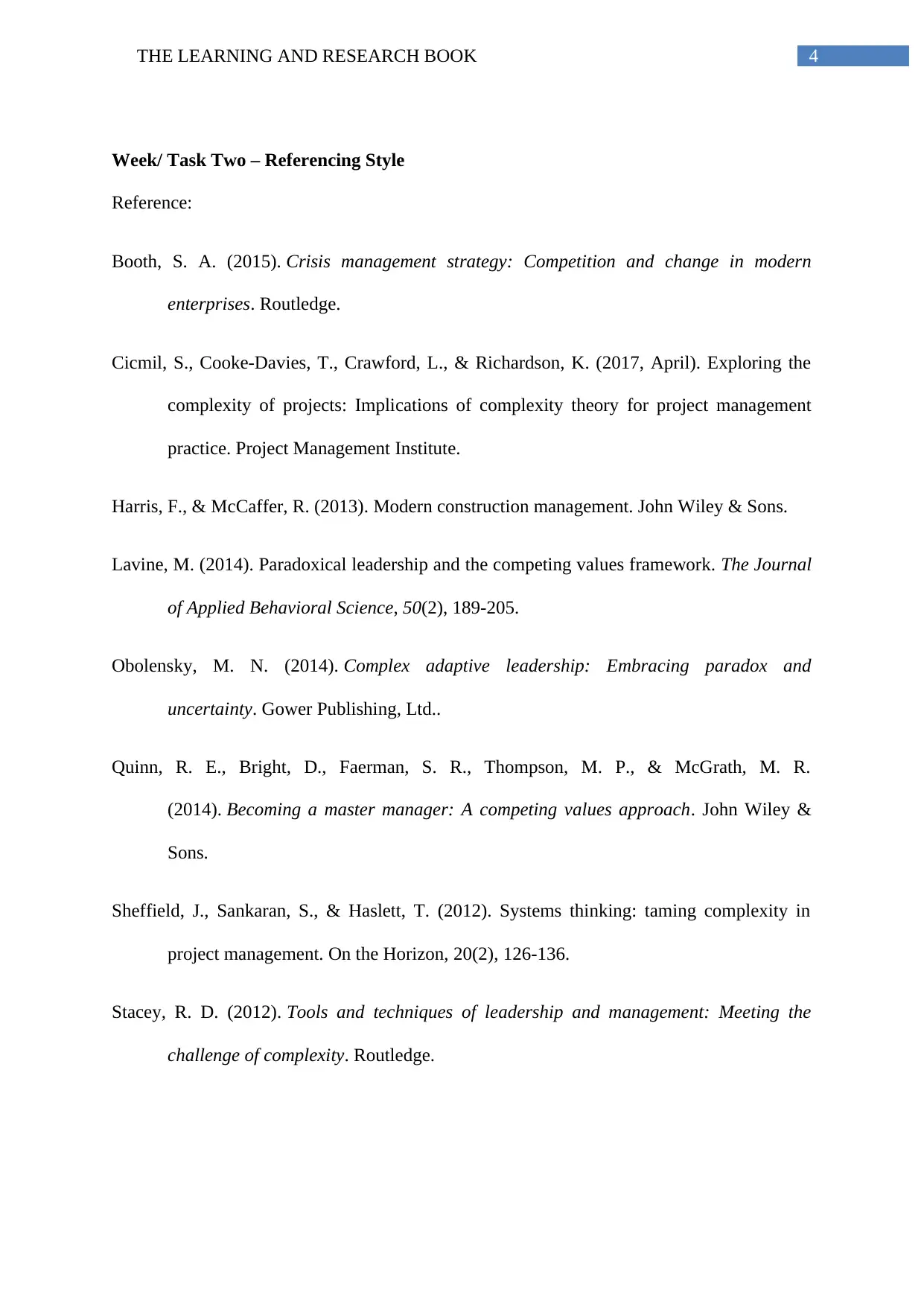
4THE LEARNING AND RESEARCH BOOK
Week/ Task Two – Referencing Style
Reference:
Booth, S. A. (2015). Crisis management strategy: Competition and change in modern
enterprises. Routledge.
Cicmil, S., Cooke-Davies, T., Crawford, L., & Richardson, K. (2017, April). Exploring the
complexity of projects: Implications of complexity theory for project management
practice. Project Management Institute.
Harris, F., & McCaffer, R. (2013). Modern construction management. John Wiley & Sons.
Lavine, M. (2014). Paradoxical leadership and the competing values framework. The Journal
of Applied Behavioral Science, 50(2), 189-205.
Obolensky, M. N. (2014). Complex adaptive leadership: Embracing paradox and
uncertainty. Gower Publishing, Ltd..
Quinn, R. E., Bright, D., Faerman, S. R., Thompson, M. P., & McGrath, M. R.
(2014). Becoming a master manager: A competing values approach. John Wiley &
Sons.
Sheffield, J., Sankaran, S., & Haslett, T. (2012). Systems thinking: taming complexity in
project management. On the Horizon, 20(2), 126-136.
Stacey, R. D. (2012). Tools and techniques of leadership and management: Meeting the
challenge of complexity. Routledge.
Week/ Task Two – Referencing Style
Reference:
Booth, S. A. (2015). Crisis management strategy: Competition and change in modern
enterprises. Routledge.
Cicmil, S., Cooke-Davies, T., Crawford, L., & Richardson, K. (2017, April). Exploring the
complexity of projects: Implications of complexity theory for project management
practice. Project Management Institute.
Harris, F., & McCaffer, R. (2013). Modern construction management. John Wiley & Sons.
Lavine, M. (2014). Paradoxical leadership and the competing values framework. The Journal
of Applied Behavioral Science, 50(2), 189-205.
Obolensky, M. N. (2014). Complex adaptive leadership: Embracing paradox and
uncertainty. Gower Publishing, Ltd..
Quinn, R. E., Bright, D., Faerman, S. R., Thompson, M. P., & McGrath, M. R.
(2014). Becoming a master manager: A competing values approach. John Wiley &
Sons.
Sheffield, J., Sankaran, S., & Haslett, T. (2012). Systems thinking: taming complexity in
project management. On the Horizon, 20(2), 126-136.
Stacey, R. D. (2012). Tools and techniques of leadership and management: Meeting the
challenge of complexity. Routledge.
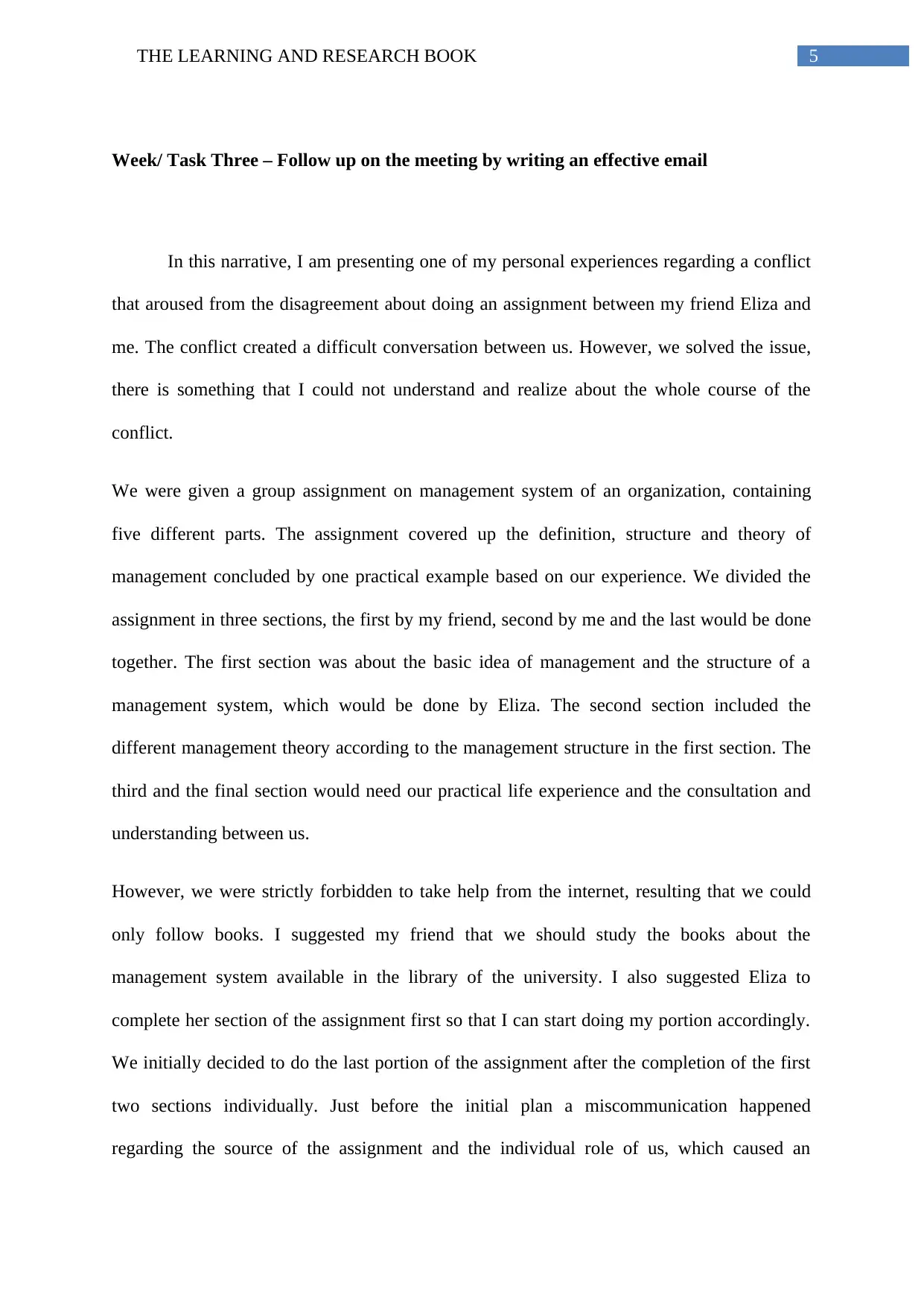
5THE LEARNING AND RESEARCH BOOK
Week/ Task Three – Follow up on the meeting by writing an effective email
In this narrative, I am presenting one of my personal experiences regarding a conflict
that aroused from the disagreement about doing an assignment between my friend Eliza and
me. The conflict created a difficult conversation between us. However, we solved the issue,
there is something that I could not understand and realize about the whole course of the
conflict.
We were given a group assignment on management system of an organization, containing
five different parts. The assignment covered up the definition, structure and theory of
management concluded by one practical example based on our experience. We divided the
assignment in three sections, the first by my friend, second by me and the last would be done
together. The first section was about the basic idea of management and the structure of a
management system, which would be done by Eliza. The second section included the
different management theory according to the management structure in the first section. The
third and the final section would need our practical life experience and the consultation and
understanding between us.
However, we were strictly forbidden to take help from the internet, resulting that we could
only follow books. I suggested my friend that we should study the books about the
management system available in the library of the university. I also suggested Eliza to
complete her section of the assignment first so that I can start doing my portion accordingly.
We initially decided to do the last portion of the assignment after the completion of the first
two sections individually. Just before the initial plan a miscommunication happened
regarding the source of the assignment and the individual role of us, which caused an
Week/ Task Three – Follow up on the meeting by writing an effective email
In this narrative, I am presenting one of my personal experiences regarding a conflict
that aroused from the disagreement about doing an assignment between my friend Eliza and
me. The conflict created a difficult conversation between us. However, we solved the issue,
there is something that I could not understand and realize about the whole course of the
conflict.
We were given a group assignment on management system of an organization, containing
five different parts. The assignment covered up the definition, structure and theory of
management concluded by one practical example based on our experience. We divided the
assignment in three sections, the first by my friend, second by me and the last would be done
together. The first section was about the basic idea of management and the structure of a
management system, which would be done by Eliza. The second section included the
different management theory according to the management structure in the first section. The
third and the final section would need our practical life experience and the consultation and
understanding between us.
However, we were strictly forbidden to take help from the internet, resulting that we could
only follow books. I suggested my friend that we should study the books about the
management system available in the library of the university. I also suggested Eliza to
complete her section of the assignment first so that I can start doing my portion accordingly.
We initially decided to do the last portion of the assignment after the completion of the first
two sections individually. Just before the initial plan a miscommunication happened
regarding the source of the assignment and the individual role of us, which caused an
⊘ This is a preview!⊘
Do you want full access?
Subscribe today to unlock all pages.

Trusted by 1+ million students worldwide
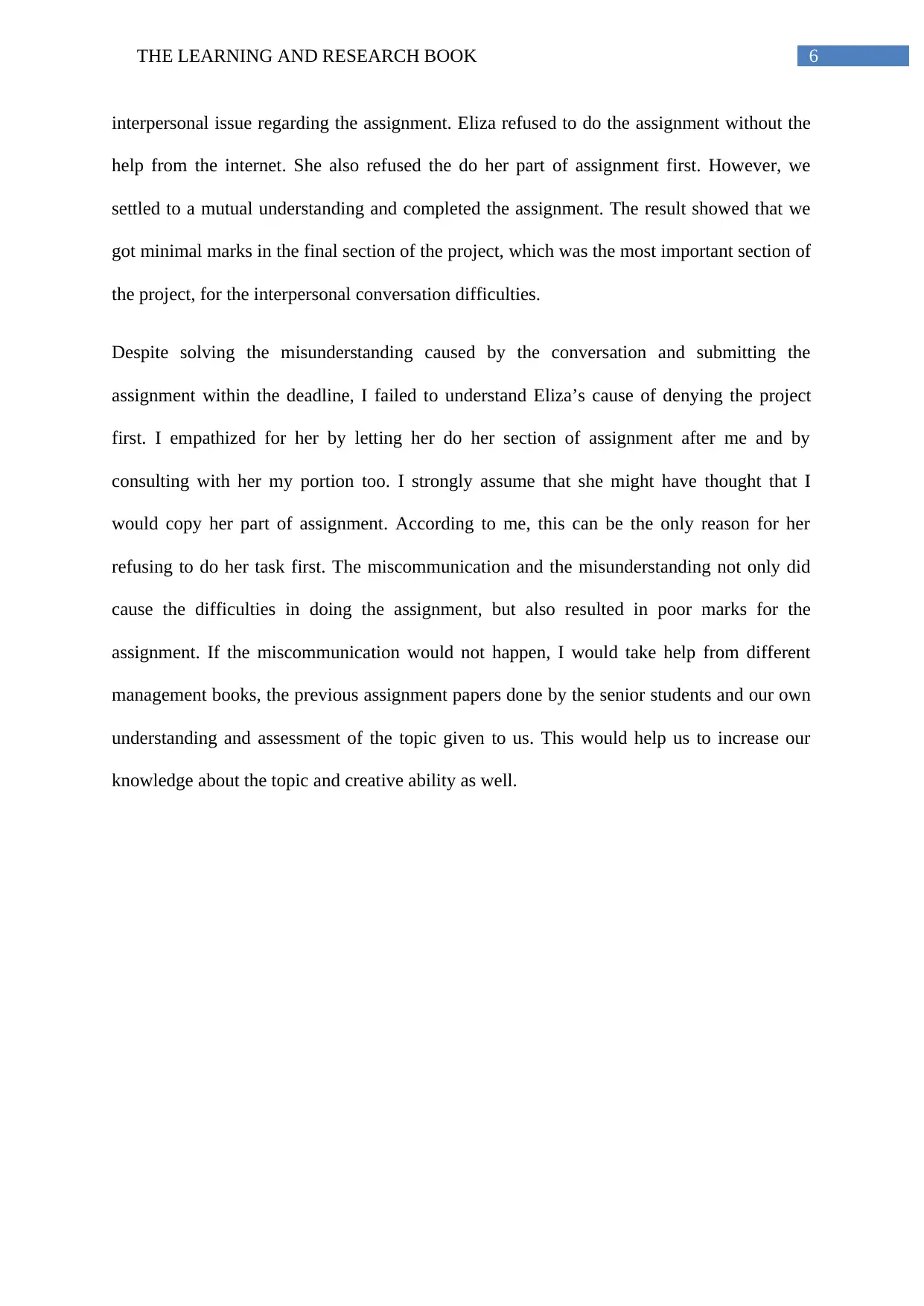
6THE LEARNING AND RESEARCH BOOK
interpersonal issue regarding the assignment. Eliza refused to do the assignment without the
help from the internet. She also refused the do her part of assignment first. However, we
settled to a mutual understanding and completed the assignment. The result showed that we
got minimal marks in the final section of the project, which was the most important section of
the project, for the interpersonal conversation difficulties.
Despite solving the misunderstanding caused by the conversation and submitting the
assignment within the deadline, I failed to understand Eliza’s cause of denying the project
first. I empathized for her by letting her do her section of assignment after me and by
consulting with her my portion too. I strongly assume that she might have thought that I
would copy her part of assignment. According to me, this can be the only reason for her
refusing to do her task first. The miscommunication and the misunderstanding not only did
cause the difficulties in doing the assignment, but also resulted in poor marks for the
assignment. If the miscommunication would not happen, I would take help from different
management books, the previous assignment papers done by the senior students and our own
understanding and assessment of the topic given to us. This would help us to increase our
knowledge about the topic and creative ability as well.
interpersonal issue regarding the assignment. Eliza refused to do the assignment without the
help from the internet. She also refused the do her part of assignment first. However, we
settled to a mutual understanding and completed the assignment. The result showed that we
got minimal marks in the final section of the project, which was the most important section of
the project, for the interpersonal conversation difficulties.
Despite solving the misunderstanding caused by the conversation and submitting the
assignment within the deadline, I failed to understand Eliza’s cause of denying the project
first. I empathized for her by letting her do her section of assignment after me and by
consulting with her my portion too. I strongly assume that she might have thought that I
would copy her part of assignment. According to me, this can be the only reason for her
refusing to do her task first. The miscommunication and the misunderstanding not only did
cause the difficulties in doing the assignment, but also resulted in poor marks for the
assignment. If the miscommunication would not happen, I would take help from different
management books, the previous assignment papers done by the senior students and our own
understanding and assessment of the topic given to us. This would help us to increase our
knowledge about the topic and creative ability as well.
Paraphrase This Document
Need a fresh take? Get an instant paraphrase of this document with our AI Paraphraser
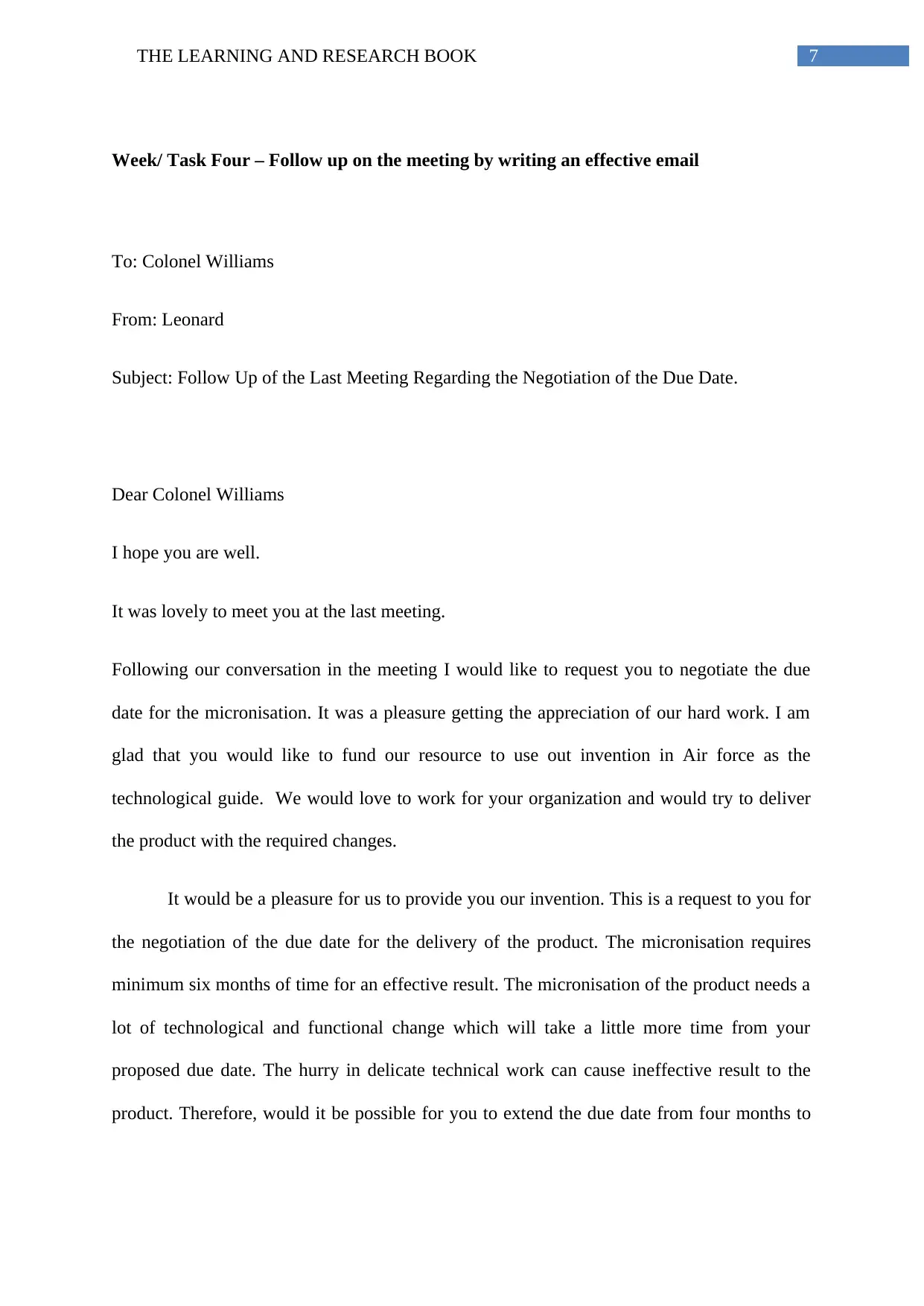
7THE LEARNING AND RESEARCH BOOK
Week/ Task Four – Follow up on the meeting by writing an effective email
To: Colonel Williams
From: Leonard
Subject: Follow Up of the Last Meeting Regarding the Negotiation of the Due Date.
Dear Colonel Williams
I hope you are well.
It was lovely to meet you at the last meeting.
Following our conversation in the meeting I would like to request you to negotiate the due
date for the micronisation. It was a pleasure getting the appreciation of our hard work. I am
glad that you would like to fund our resource to use out invention in Air force as the
technological guide. We would love to work for your organization and would try to deliver
the product with the required changes.
It would be a pleasure for us to provide you our invention. This is a request to you for
the negotiation of the due date for the delivery of the product. The micronisation requires
minimum six months of time for an effective result. The micronisation of the product needs a
lot of technological and functional change which will take a little more time from your
proposed due date. The hurry in delicate technical work can cause ineffective result to the
product. Therefore, would it be possible for you to extend the due date from four months to
Week/ Task Four – Follow up on the meeting by writing an effective email
To: Colonel Williams
From: Leonard
Subject: Follow Up of the Last Meeting Regarding the Negotiation of the Due Date.
Dear Colonel Williams
I hope you are well.
It was lovely to meet you at the last meeting.
Following our conversation in the meeting I would like to request you to negotiate the due
date for the micronisation. It was a pleasure getting the appreciation of our hard work. I am
glad that you would like to fund our resource to use out invention in Air force as the
technological guide. We would love to work for your organization and would try to deliver
the product with the required changes.
It would be a pleasure for us to provide you our invention. This is a request to you for
the negotiation of the due date for the delivery of the product. The micronisation requires
minimum six months of time for an effective result. The micronisation of the product needs a
lot of technological and functional change which will take a little more time from your
proposed due date. The hurry in delicate technical work can cause ineffective result to the
product. Therefore, would it be possible for you to extend the due date from four months to
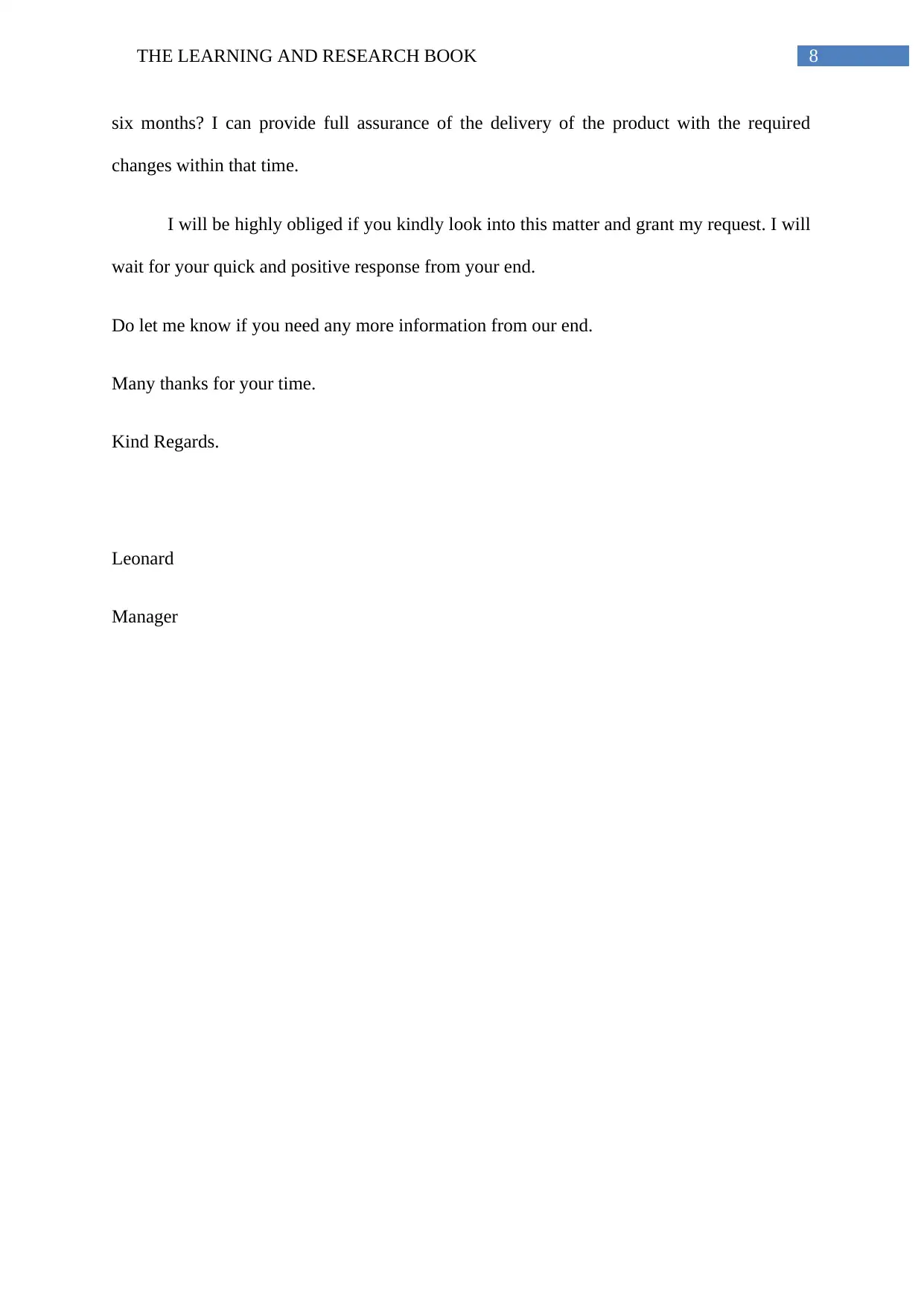
8THE LEARNING AND RESEARCH BOOK
six months? I can provide full assurance of the delivery of the product with the required
changes within that time.
I will be highly obliged if you kindly look into this matter and grant my request. I will
wait for your quick and positive response from your end.
Do let me know if you need any more information from our end.
Many thanks for your time.
Kind Regards.
Leonard
Manager
six months? I can provide full assurance of the delivery of the product with the required
changes within that time.
I will be highly obliged if you kindly look into this matter and grant my request. I will
wait for your quick and positive response from your end.
Do let me know if you need any more information from our end.
Many thanks for your time.
Kind Regards.
Leonard
Manager
⊘ This is a preview!⊘
Do you want full access?
Subscribe today to unlock all pages.

Trusted by 1+ million students worldwide
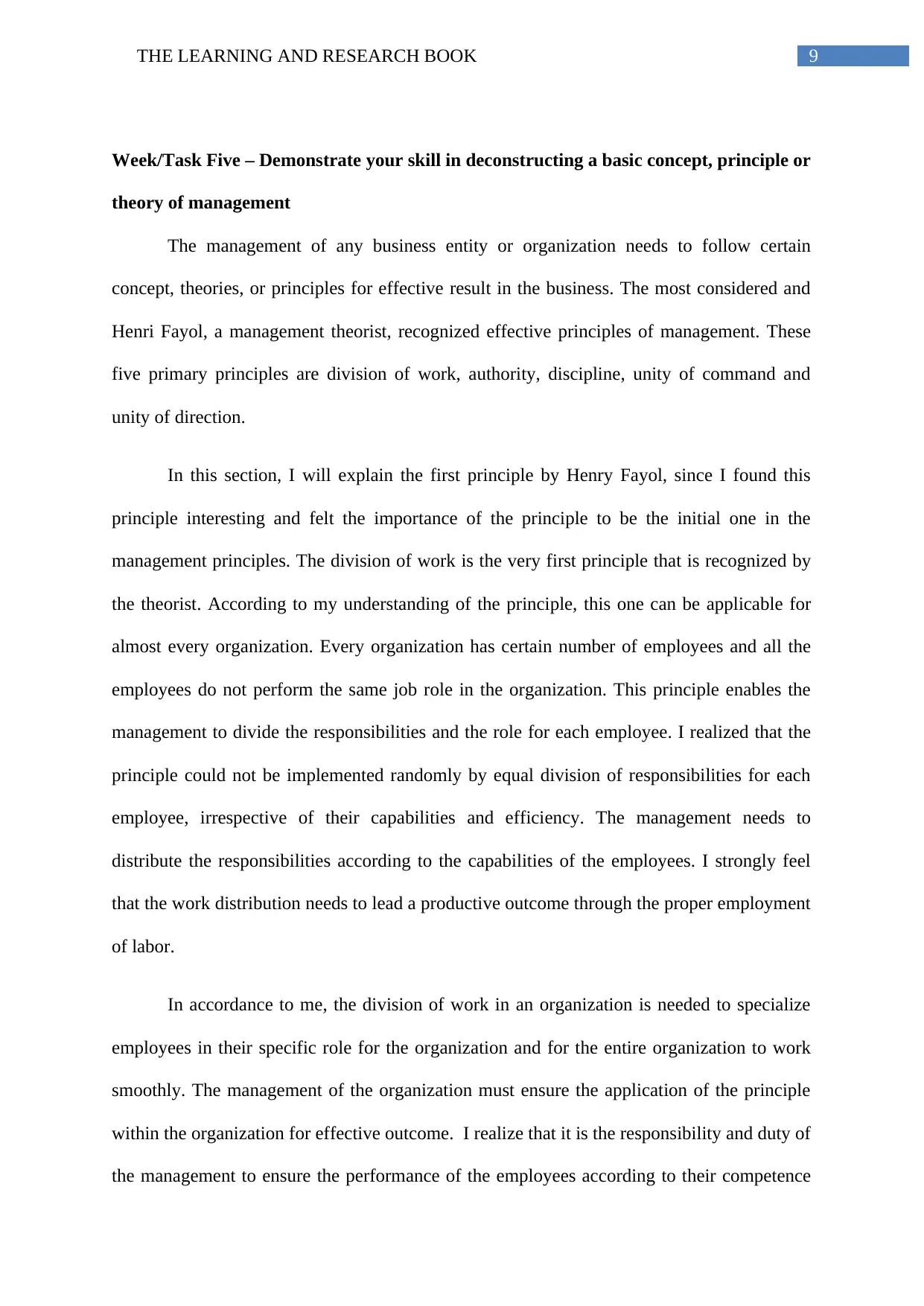
9THE LEARNING AND RESEARCH BOOK
Week/Task Five – Demonstrate your skill in deconstructing a basic concept, principle or
theory of management
The management of any business entity or organization needs to follow certain
concept, theories, or principles for effective result in the business. The most considered and
Henri Fayol, a management theorist, recognized effective principles of management. These
five primary principles are division of work, authority, discipline, unity of command and
unity of direction.
In this section, I will explain the first principle by Henry Fayol, since I found this
principle interesting and felt the importance of the principle to be the initial one in the
management principles. The division of work is the very first principle that is recognized by
the theorist. According to my understanding of the principle, this one can be applicable for
almost every organization. Every organization has certain number of employees and all the
employees do not perform the same job role in the organization. This principle enables the
management to divide the responsibilities and the role for each employee. I realized that the
principle could not be implemented randomly by equal division of responsibilities for each
employee, irrespective of their capabilities and efficiency. The management needs to
distribute the responsibilities according to the capabilities of the employees. I strongly feel
that the work distribution needs to lead a productive outcome through the proper employment
of labor.
In accordance to me, the division of work in an organization is needed to specialize
employees in their specific role for the organization and for the entire organization to work
smoothly. The management of the organization must ensure the application of the principle
within the organization for effective outcome. I realize that it is the responsibility and duty of
the management to ensure the performance of the employees according to their competence
Week/Task Five – Demonstrate your skill in deconstructing a basic concept, principle or
theory of management
The management of any business entity or organization needs to follow certain
concept, theories, or principles for effective result in the business. The most considered and
Henri Fayol, a management theorist, recognized effective principles of management. These
five primary principles are division of work, authority, discipline, unity of command and
unity of direction.
In this section, I will explain the first principle by Henry Fayol, since I found this
principle interesting and felt the importance of the principle to be the initial one in the
management principles. The division of work is the very first principle that is recognized by
the theorist. According to my understanding of the principle, this one can be applicable for
almost every organization. Every organization has certain number of employees and all the
employees do not perform the same job role in the organization. This principle enables the
management to divide the responsibilities and the role for each employee. I realized that the
principle could not be implemented randomly by equal division of responsibilities for each
employee, irrespective of their capabilities and efficiency. The management needs to
distribute the responsibilities according to the capabilities of the employees. I strongly feel
that the work distribution needs to lead a productive outcome through the proper employment
of labor.
In accordance to me, the division of work in an organization is needed to specialize
employees in their specific role for the organization and for the entire organization to work
smoothly. The management of the organization must ensure the application of the principle
within the organization for effective outcome. I realize that it is the responsibility and duty of
the management to ensure the performance of the employees according to their competence
Paraphrase This Document
Need a fresh take? Get an instant paraphrase of this document with our AI Paraphraser
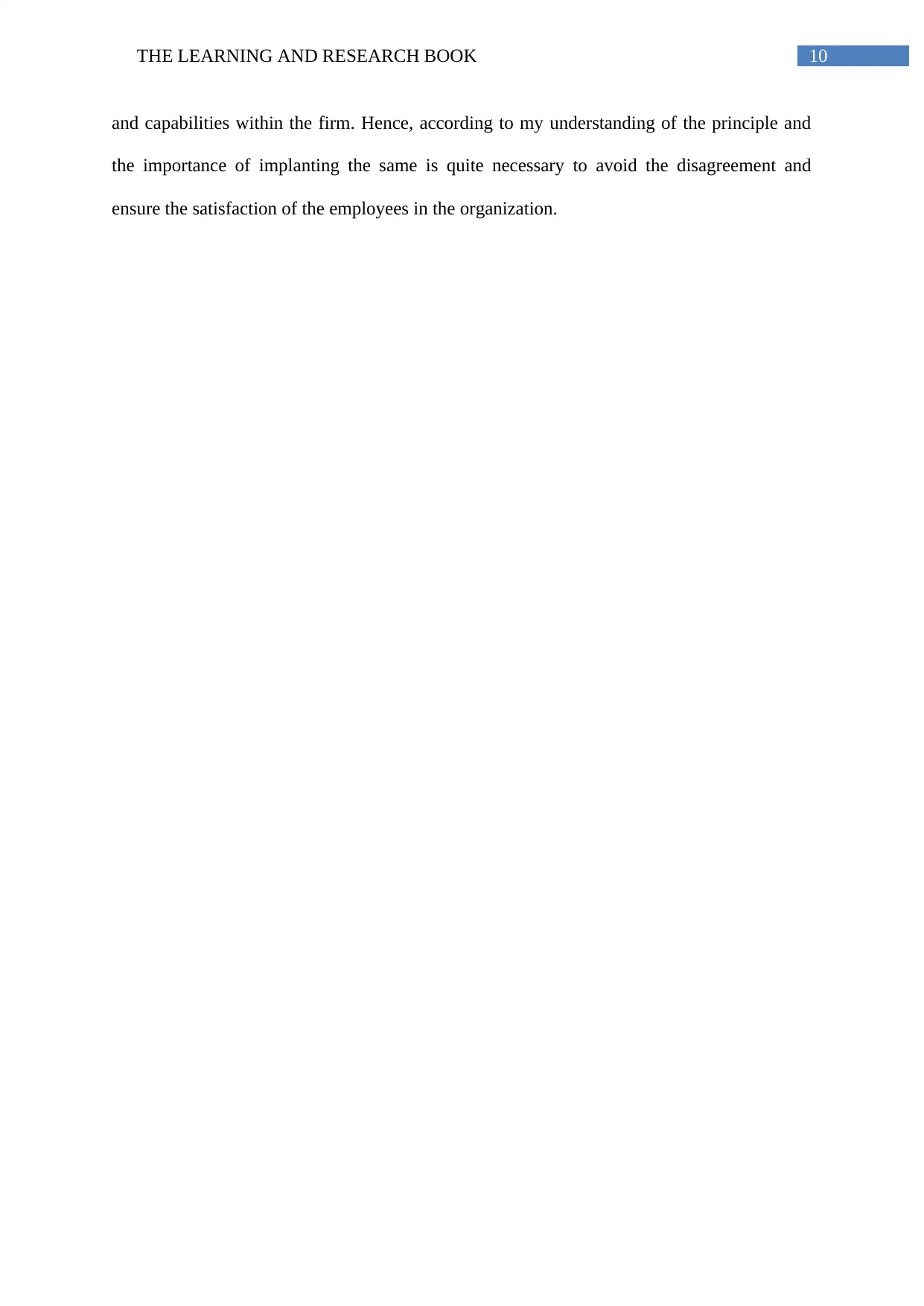
10THE LEARNING AND RESEARCH BOOK
and capabilities within the firm. Hence, according to my understanding of the principle and
the importance of implanting the same is quite necessary to avoid the disagreement and
ensure the satisfaction of the employees in the organization.
and capabilities within the firm. Hence, according to my understanding of the principle and
the importance of implanting the same is quite necessary to avoid the disagreement and
ensure the satisfaction of the employees in the organization.
1 out of 11
Related Documents
Your All-in-One AI-Powered Toolkit for Academic Success.
+13062052269
info@desklib.com
Available 24*7 on WhatsApp / Email
![[object Object]](/_next/static/media/star-bottom.7253800d.svg)
Unlock your academic potential
Copyright © 2020–2026 A2Z Services. All Rights Reserved. Developed and managed by ZUCOL.




